Did you ever contemplate buying a house in Austria as a foreigner? If so, it’s crucial to understand the unique regulations that govern property ownership in Austria for non-citizens. While foreigners are indeed permitted to buy real estate in Austria, certain stipulations apply. Non-EU citizens, for instance, must obtain a specific permit to purchase property, and third-country nationals need approval from the Land Commission1. However, European Union (EU) and European Economic Area (EEA) citizens largely enjoy the same rights as Austrians, with a few exceptions such as farmland restrictions2.
For non-EU residents looking to delve into the picturesque Austrian real estate market, opportunities exist in regions like Vienna, which is notably more foreigner-friendly, and other select areas such as Styria, Carinthia, and suburban zones of Vienna3. To make the process smoother, legal entities need to ensure that the majority of their shares are EU-resident owned1. The property market in Austria remains attractive due to the country’s exceptional quality of life, relative affordability, and stunning Alpine scenery.
Moreover, it’s worth noting that the real estate acquisition for foreigners doesn’t directly grant residency or citizenship, though significant time spent in Austria annually is essential2. Intrigued? Read more about the intricacies of buying property in Austria on this insightful page.
Key Takeaways: How to Buy a Property in Austria
- Foreigners can buy real estate in Austria, subject to specific permits and regulations.
- EU and EEA citizens have similar property purchasing rights as Austrian natives, except for farmland.
- Vienna is the most accommodating for foreign buyers, unlike Salzburg, Vorarlberg, and Tirol.
- Non-EU residents need an EU residence permit to acquire property in certain Austrian regions.
- Third-country nationals require Land Commission approval for property purchases, a process that could take several weeks to months.
Contact us if you are Interested in Buying Property Abroad!
Overview of the Real Estate Market in Austria
The Austrian real estate market presents significant real estate investment opportunities in Austria for foreigners, driven by stable growth and moderate yields. Currently, the market showcases a favorable environment for both local and foreign investors, with recent trends showing a consistent rise in property prices.
Current Property Prices and Trends
Analyzing the current property prices in Austria, the average cost of a new house stands at €359,000, reflecting the rising demand and popularity of new-build properties4. Additionally, the national average rent is approximately €390 per month, with regional variations such as Carinthia having the lowest average rent at €310 and Vorarlberg the highest at €5004. The Austrian real estate market’s stability is further exemplified by the nearly 10% rise in real estate prices in Vienna during 20184.
Residential Property Price Index
The residential property price index in Austria has shown a substantial increase, signifying a healthy market trajectory5. Vienna, in particular, has witnessed a notable year-on-year growth of 7.62% by Q3 2019, underscoring its status as a prime location for investment5. Such trends provide real estate investment opportunities in Austria for foreigners, making it an attractive market for international investors. The consistent upward trend in property values is a testament to Austria’s robust economic fundamentals and investor-friendly climate.
Popular Regions for Property Investment
Several regions in Austria hold significant appeal for property investments. Vienna remains a top choice for those seeking vibrant urban living combined with a high potential for property value appreciation. On the other hand, areas such as Burgenland and Styria offer more affordable property options, attracting investors looking for lucrative opportunities outside the capital5.
Moreover, the picturesque skiing regions of Tyrol and Vorarlberg, known for their scenic beauty, remain popular despite being largely restricted to EU citizens5. Understanding these regional dynamics can help investors make informed decisions and identify the most promising areas for real estate investment opportunities in Austria for foreigners.
Legal Regulations for Foreign Buyers in Austria
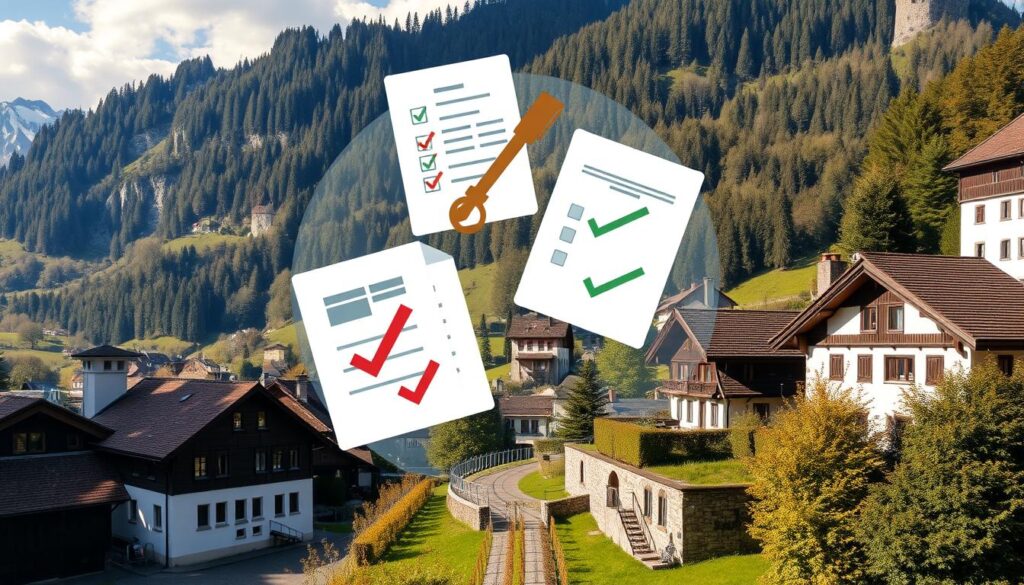
When considering non-residents purchasing real estate in Austria, it is vital to understand the comprehensive legal regulations for foreign buyers in Austria. These laws ensure that property transactions align with both national and regional interests, especially for non-EU citizens.
Permit Requirements
For non-EU citizens, such as Americans, the journey to property ownership often necessitates special permits and approvals from local government authorities6. This approval process ensures that the intended purchase is in harmony with regional planning and adheres to the buyer’s intentions6. For EU citizens, however, the process is notably more straightforward, as they are generally treated the same as Austrian citizens and do not need approval to buy property7.
Key documents required for property acquisition in Austria include a valid passport and proof of funds6. It is highly advisable to engage local real estate agents and legal representatives to navigate the legal complexities and language barriers, ensuring compliance with all legal requirements6.
Restrictions by Municipality
Each municipality in Austria may impose its own restrictions, creating a varied landscape for non-residents purchasing real estate in Austria. For instance, there are specific restrictions on acquiring second homes in certain tourist-attractive municipalities7. These measures are designed to regulate property markets and protect local interests. Additionally, different real estate laws apply in different Austrian states, leading to variations in definitions, requirements, and procedures for property transactions7.
Certain property types and locations, particularly sensitive areas like farmland, forests, and properties near borders, also have restrictions for non-EU citizens, including Americans6. The land acquisition process in these areas can be particularly complex, necessitating a thorough assessment of all real regulations for foreign buyers in Austria.
Purchasing Process for Non-Residents in Austria
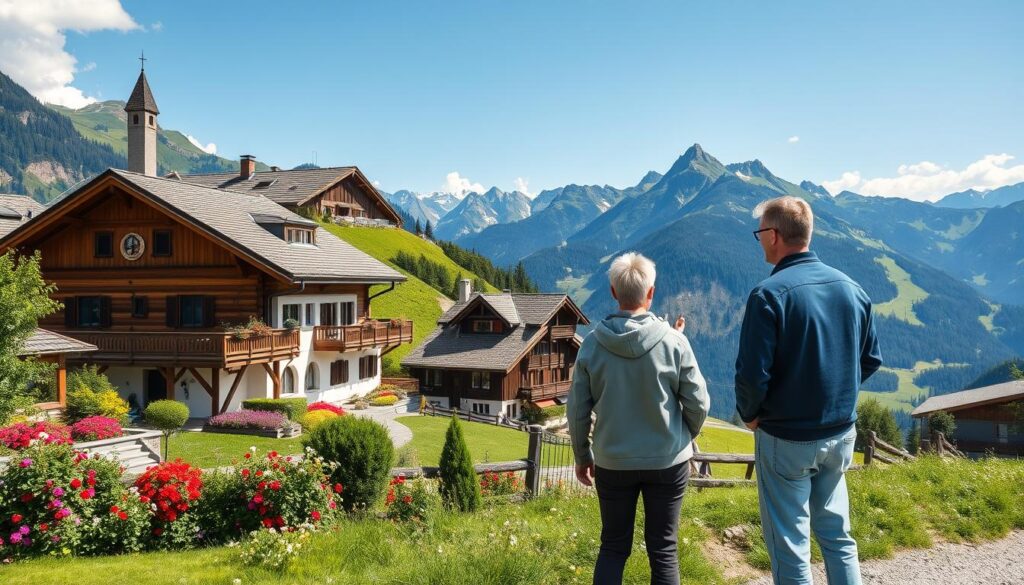
Purchasing real estate in Austria as a non-Austrian involves a series of steps and requires specific documentation. Understanding the intricacies of this process is essential for a smooth transaction. The first step is identifying the right property, followed by navigating through the necessary steps such as making an offer, paying a deposit, engaging a solicitor and notary, arranging a survey, and finalizing the sale. Approval from real estate transaction authorities is typically necessary, especially for non-EU citizens7.
Steps to Buy Property
The steps to buy property in Austria can be summarized as follows:
- Identify the Property: Begin by evaluating different property types like Permanent Residence or Tourist Residence (purchasing real estate in Austria as a non-Austrian).
- Make an Offer: Once the right property is found, make a formal offer to the seller.
- Pay a Deposit: A deposit, generally 10% of the purchase price, is required to secure the property8.
- Engage a Solicitor and Notary: Legal representation helps ensure compliance with local laws7.
- Arrange a Survey: Conducting a survey is essential to avoid any unforeseen issues.
- Finalize the Sale: The final step includes notarizing documents and registering the property in the Land Registry8. Additional costs for the property purchase in Austria range from 9-11% of the purchase price7.
Necessary Documentation
Buying real estate in Austria documentation varies based on whether the buyer is from the EU or outside of it. EU citizens are usually exempt from needing approval, while non-EU foreigners require approval from real estate transaction authorities7. The necessary paperwork often includes:
- Proof of Identity: Passports and visas for non-EU citizens.
- Financial Statements: Proof of funds available for the purchase.
- Notary Documentation: Legal documents related to the purchase and registration8.
It’s beneficial to have local legal representation to ensure compliance and understanding of the complex procedures involved in purchasing real estate in Austria as a non-Austrian complete buying guide. Following these steps to buy property in Austria can make the process more streamlined and efficient.
Costs Associated with Buying Property in Austria
Understanding the costs of buying a property in Austria is crucial for potential buyers, especially foreign investors. These costs encompass various fees and taxes that contribute significantly to the total outlay.
Transfer Taxes and Fees
One of the primary expenses when purchasing real estate in Austria is the transfer tax, which stands at a substantial 3.5% of the property value9. This tax is paid by the buyers and is applicable across all property types. Additionally, buyers should be aware of VAT, which is only imposed on newly built properties9. The registration fee for the property is another essential cost, typically set at 1.1% of the property price9. Stamp duty, ranging from 0.5% to 1%, must also be factored in9.
Legal and Notary Fees
Legal and notary fees in Austria range from 1% to 3% of the property’s value9. Although these fees might vary between regions, the cumulative legal expenses, including notary services, authentication fees, and other related costs, can sum up to approximately 10.5% of the offered price9. These professionals ensure that all legal aspects of the transaction are appropriately handled, providing peace of mind to buyers through proper documentation and adherence to local laws.
Real Estate Agent Fees
The involvement of real estate agents is pivotal in the Austrian property market. Real estate agent fees in Austria are typically around 3% to 4% of the property value, plus 20% VAT3. These agents play a crucial role in guiding buyers through the market, assisting with property viewings, negotiations, and finalizing deals [source]. They also help navigate the local regulations, ensuring that all aspects of the purchase are clear and legally compliant.
In conclusion, the costs of buying a property in Austria span various aspects: from the transfer taxes and fees to legal and notary fees and the real estate agent fees in Austria. Understanding these elements can help prospective buyers prepare adequately for their investment. Integrating expert guidance and due diligence into the process ensures a smoother and more secure transaction.
Contact us if you are Interested in Buying Property Abroad!
Financing Real Estate Purchases as a Foreign Investor
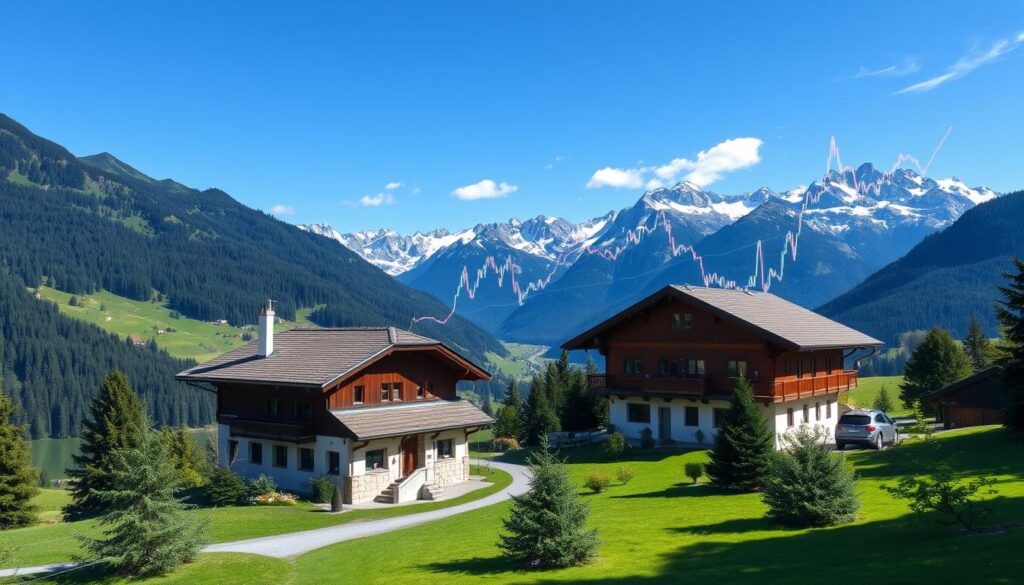
For foreign investors, financing real estate purchases in Austria comes with various mortgage options, favorable interest rates, and specific documentation requirements. Understanding the intricacies can help navigate the process effectively.
Mortgage Options
Foreign investors keen on financing their real estate purchases in Austria can choose from several mortgage options. These include fixed-rate mortgages, adjustable-rate mortgages, and combination mortgages. Typically, mortgages can cover up to 70% of the property’s value, making them a viable option despite high property prices, such as those in Vienna where apartment prices can exceed EUR 1 million10. It’s vital to evaluate these mortgage options carefully to find the one that best suits your financial situation and investment goals.
Interest Rates and Loan Terms
Interest rates in Austria are currently favorable, allowing for reasonable loan terms for foreign investors. While the Austrian mortgage market is relatively small compared to other European countries, local lenders provide competitive rates and terms11. Understanding the specifics of these rates and terms is crucial for making an informed decision when getting a mortgage in Austria.
Documents Required for Mortgage Approval
Securing mortgage approval as a foreign investor requires comprehensive documentation. Typically, lenders will ask for proof of income, a detailed credit history, and proper identification. Non-EU citizens might face more stringent requirements compared to EU citizens, who may find it easier to obtain financing from local lenders11. Additionally, opening a local bank account can significantly streamline the mortgage application process.
Financing real estate purchases in Austria can be a straightforward process if you meet the necessary criteria and prepare your documentation thoroughly.
Rules for Foreigners Buying Property in Austria
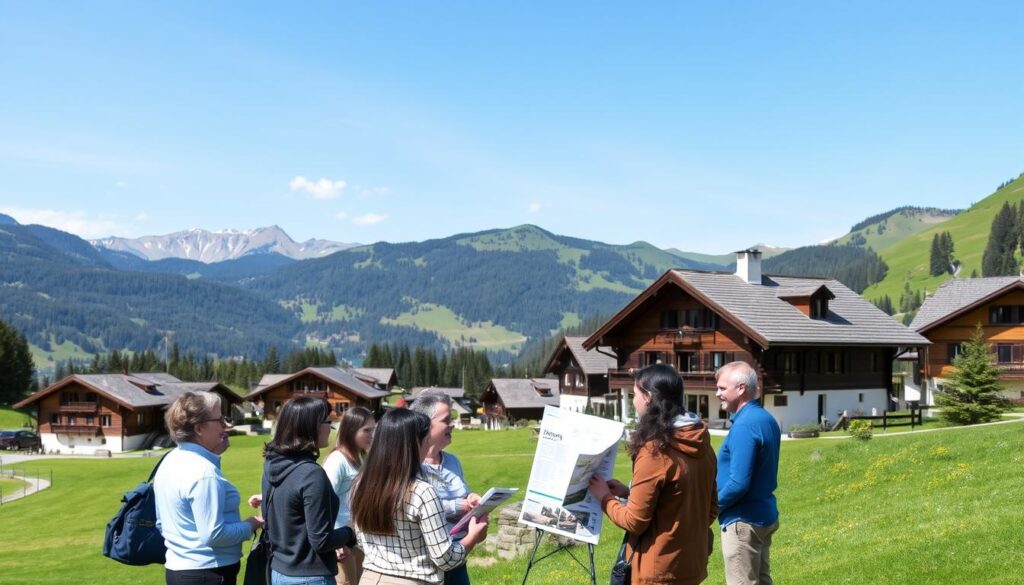
For those interested in the rules for foreigners buying property in Austria, it is essential to understand the stringent but navigable regulations. Overseas investors owning property in Austria must adhere to specific guidelines, especially if they are non-EU citizens.
To begin with, the acquisition of a property-buying permit is mandatory for non-residents. This rule is relaxed for EU and EEA-member state citizens, who can purchase property without major restrictions. Conversely, third-country citizens face a more rigorous approval process, often mandated by the specific municipality12. For instance, British citizens post-Brexit are now classified as third-country nationals and must navigate additional barriers when buying property in Austria, particularly in alpine regions13.
Municipal restrictions vary by region. The city of Vienna, for example, is known for being more receptive to overseas investors owning property in Austria. Establishing intercompany holdings or using company structures can simplify the property acquisition process for nonnationals in Vienna12. This approach circumvents the need for direct approval.
Additionally, Vienna has been recognized for its favorable living conditions and affordable real estate prices compared to other European cities. For example, a new apartment in Vienna’s 4th district costs around €5,400 per square meter, which is significantly lower than prices in Munich and Zurich12. This affordability, coupled with low interest rates, makes owning real estate in Vienna an attractive option for foreign buyers.
It’s worth noting that the overall property purchasing process in Austria takes approximately three months. This timeframe includes an in-depth inspection stage, the reservation process, notarizing the sales contract, executing the transaction payment, and registering the property rights in the State Real Estate Cadastre12. Consulting with real estate specialists, such as those at Mercury Estate, is highly recommended to ensure compliance with all local regulations12.
In summary, navigating the rules for foreigners buying property in Austria and understanding municipal restrictions are crucial steps for a successful acquisition. By leveraging available resources and seeking expert guidance, overseas investors owning property in Austria can enjoy both residential and investment opportunities in this culturally enriched nation.
Advantages of Buying Property in Austria
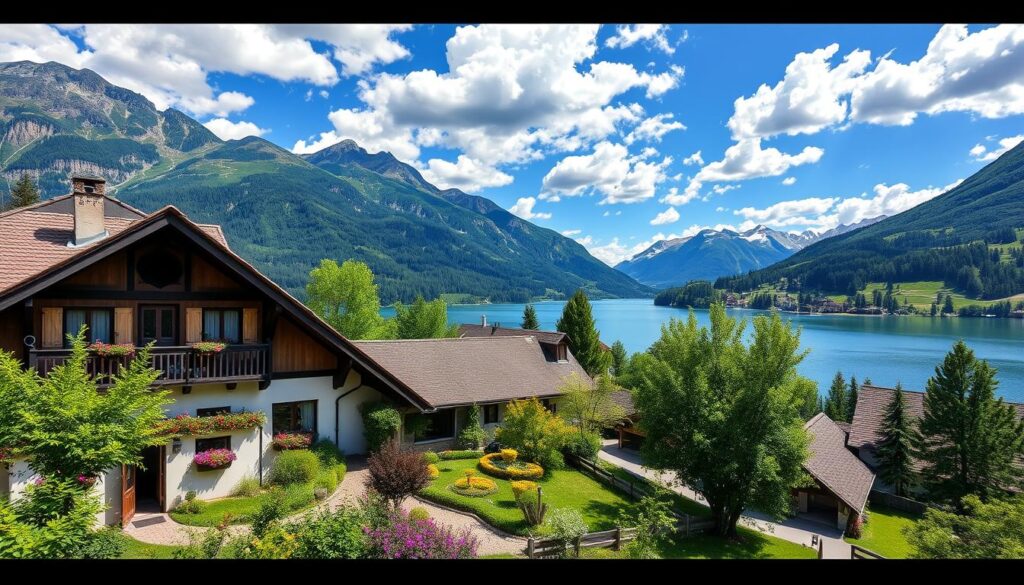
The benefits of buying property in Austria are numerous, making it an attractive option for investors around the globe. From its superb quality of life to diverse investment opportunities, Austria stands out as a prime real estate destination with incredible value.
Quality of Life and Amenities
The quality of life in Austria is renowned for its excellence. Austria boasts an efficient healthcare system, low crime rates, and excellent public services, all of which contribute to a high standard of living. Furthermore, the charm of cities like Vienna with its rich cultural heritage adds to the allure of buying property here.
Investment Opportunities
The real estate market in Austria is ripe with diverse investment opportunities. Whether investors are eyeing urban apartments in historic cities like Vienna or picturesque alpine chalets in Tyrol, there’s a wide range of options to suit different preferences. The stable economy of Austria further bolsters the attractiveness of these investments. Particularly in Vienna, the average real estate price stands at €4,611 per m², reflecting the city’s demand for properties3. For non-EU citizens, securing a residency permit is crucial before purchasing real estate in Austria14.
Scenic Locations and Tourist Attractions
Austria’s natural beauty significantly enhances its appeal. The presence of numerous Austria tourist attractions, from stunning alpine landscapes to serene lakes, positions properties in these regions as excellent candidates for generating rental income. Hotspots like Tyrol and Salzburg not only attract tourists but also drive property prices upwards, ensuring a profitable investment potential. Additionally, landlords in Austria pay an income tax based on their annual rental income, which ranges from 20% to 55%3.
Foreign nationals, especially from EU and EEA countries, face minimal restrictions when investing in Austrian real estate. Engaging a qualified lawyer specializing in real estate transactions is advisable to navigate any legal complexities and notary fees. For a detailed guide on the benefits of buying property in Austria, you can check this useful resource3.
Moreover, properties in charming locations offer serene lifestyle benefits, making these investments worthwhile for those seeking both financial returns and a superior living environment.
Property Ownership Options for Non-Citizens
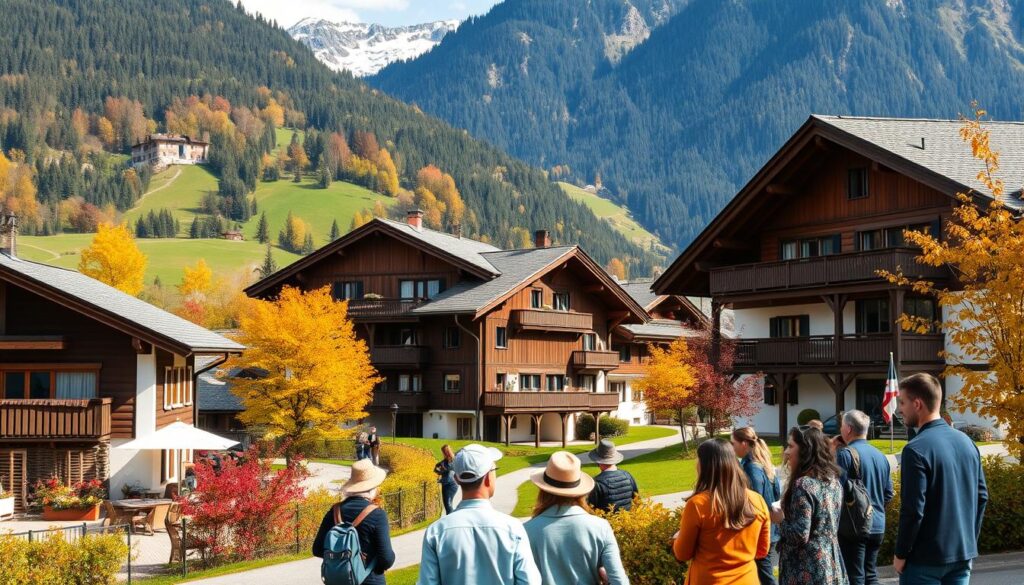
Property ownership in Austria for non-citizens can be a complex endeavor, as foreign buyers must navigate a variety of regulations and restrictions. However, opportunities do exist for non-citizens to own properties, including the coveted second home status and investment properties.
Second Home Status
Non-citizens can seek second home status in Austria, which remains an attractive option due to the country’s desirable living conditions. Second home status properties are primarily available in the Salzburg province, although availability is limited. Non-EU residents often consider purchasing such properties due to the excellent quality of life, robust medical care, and favorable property prices [Investing in real estate in Austria]. This status, however, comes with stipulations around property usage and residency requirements. In Austria, citizens of EU countries, Switzerland, Iceland, Norway, or Liechtenstein can buy property without additional permits15. Conversely, countries like Hungary require foreigners to obtain permits from local authorities for real estate purchases15.
Investment Properties
Austria investment properties for foreigners offer enticing prospects, with options ranging from residential to certain commercial real estates. However, these opportunities are often reserved for EU citizens, and non-EU residents may face more stringent restrictions. Typically, the agent’s commission for real estate transactions in Austria is 3% of the property value16. Non-EU citizens in Cyprus, for instance, need official permission from the Council of Ministers to purchase property15, whereas the UAE allows non-Arab foreigners to buy property in designated freehold areas, albeit with ownership restrictions15. Furthermore, non-EU citizens seeking to invest in Austrian properties must be well-versed with provincial regulations as regions like Vienna and Graz have distinct property purchase stipulations for third-country nationals17.
In summation, navigating property ownership in Austria for non-citizens involves thorough understanding of local laws, potential fees, and the unique stipulations associated with both second home status and investment properties.
Challenges Faced by Foreign Buyers
Acquiring real estate in Austria can come with a host of challenges for foreign investors, particularly those unfamiliar with local property laws. One of the primary hurdles involves understanding property laws in Austria as a foreigner. Foreign buyers often need to navigate a complex web of municipal regulations, special permits, and national legislation. For instance, foreign legal entities with more than 50% non-EU shareholders may require a special permit to purchase property in Austria18. Moreover, the language barrier can make deciphering these regulations even more daunting.
Understanding Local Laws
Understanding property laws in Austria as a foreigner is indispensable for avoiding pitfalls during the investment process. The property registration process alone can take anywhere from 9 to 32 days and involves fees of approximately 4.5% of the property’s value18. Buyers and investors should also consider that specific municipalities might impose additional restrictions or requirements, further complicating the transaction.
High Transaction Costs
One of the more substantial challenges for foreigners buying real estate in Austria is the high transaction costs. These costs can range from 9.4% to 13% of the property’s value and include various fees such as legal, notary, and real estate agent fees as well as taxes. For instance, property transfer tax in Austria can be up to 3.5% of the property’s cost318. Additionally, mortgage registration fees are 0.6% of the mortgage value, and issuing a mortgage itself can cost between 1% and 2% of the loan amount18. Preparing for these costs is essential for foreign buyers aiming for a smooth real estate acquisition.
Contact us if you are Interested in Buying Property Abroad!
FAQ
Can Foreigners buy Real Estate in Austria?
Yes, foreigners can buy real estate in Austria, although non-residents require a permit. EU citizens face fewer restrictions compared to non-EU citizens.
What are the current trends in the Austrian real estate market?
The Austrian real estate market has shown steady growth, with property prices increasing year-on-year. For example, the residential property price index rose by 5.22% in Q3 2019, with Vienna experiencing a 7.62% increase, making it a hotspot for investment.
What are the popular regions for property investment in Austria?
Popular investment regions include Vienna for its urban appeal, Burgenland and Styria for more affordable options, and the picturesque skiing regions of Tyrol and Vorarlberg, mainly accessible to EU citizens.
What are the legal regulations for foreign buyers in Austria?
Foreign buyers must obtain a permit to purchase property in Austria. Regulations are more lenient for EU, EEA, and Swiss nationals. Municipal restrictions may vary, with some areas being especially challenging for non-EU citizens.
What are the steps to buy property in Austria as a non-resident?
The process includes identifying a property, making an offer, paying a deposit, hiring a solicitor and notary, arranging a survey, and finalizing the sale. Necessary documentation typically includes proof of identity and financial statements.
What are the costs associated with buying property in Austria?
Transaction costs can range from 9.4% to 13% of the property value, including legal fees, notary fees, transfer taxes, and real estate agent fees. The transfer tax is standard at 3.5%, and VAT may apply to new properties.
What mortgage options are available for foreign investors in Austria?
Foreign investors can explore various mortgage options such as fixed-rate, adjustable-rate, and combination mortgages. Financing can be up to 70% of the property’s value, with favorable interest rates and variable loan terms.
What rules must foreigners adhere to when buying property in Austria?
Foreigners need to obtain a property-buying permit and comply with local municipal restrictions. Non-EU citizens often must demonstrate significant ties to Austria or contribute culturally or economically.
What are the advantages of buying property in Austria?
Advantages include a high quality of life, stable economy, rich cultural heritage, scenic locations, and tourist attractions. Properties in tourist regions can generate rental income, enhancing their investment appeal.
Are there specific property ownership options for non-citizens in Austria?
Non-citizens may opt for “second home” status properties, particularly in the Salzburg province. Investment properties range from residential to commercial real estate, though many options are restricted to EU citizens.
What challenges do foreign buyers face when purchasing property in Austria?
Challenges include navigating complex local laws and regulations, high transaction costs (ranging from 9.4% to 13% of the property’s value), and understanding municipal restrictions. Preparing for these hurdles is essential for a successful purchase.
Source Links
- https://luxury-vienna.com/blog/buying-property-in-austria
- https://vigoimmobilien.at/en/can-a-foreign-legal-entity-buy-property-in-austria/
- https://immigrantinvest.com/real-estate/guides/austria/
- https://www.expatica.com/at/housing/housing-basics/housing-in-austria-88793/
- https://www.vindobona.org/article/buying-real-estate-in-austria-things-you-should-consider-first
- https://investropa.com/blogs/news/austria-us-citizen-property-ownership
- https://www.geuer.at/en/2024/04/22/buying-property-in-austria-as-a-foreigner/
- https://www.investorsinproperty.com/news/2024-03-27/austria-faqs
- https://lawyersaustria.com/purchasing-a-property-in-austria/
- https://www.ennessglobal.com/mortgages/mortgages-in-austria
- https://investropa.com/blogs/news/austria-real-estate-foreigner
- https://www.lexology.com/library/detail.aspx?g=82adff54-3725-4415-8303-35efc900beaf
- https://www.alpinepropertyfinders.com/austrian-purchase-process
- https://wise.com/us/blog/best-countries-to-buy-property-abroad
- https://realting.com/news/where-it-is-banned-or-hard-for-foreigners-to-buy-real-estate
- https://vigoimmobilien.at/en/the-main-steps-of-buying-property-in-austria/
- https://www.britishinaustria.net/forum/topic/buying-property-in-austria-as-a-third-country-citizen/
- https://luxury-vienna.com/blog/buying-a-property

Comments